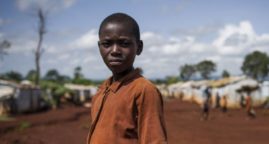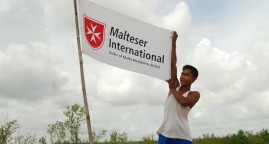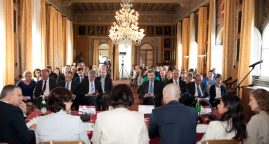‘Triple crisis’ afflicting Venezuelan refugees
Article published on The Catholic Register website on 04/20/2018 by Michael Swann
While the biggest refugee crisis in the Western Hemisphere languishes in media obscurity, one Catholic agency is working with the most vulnerable Venezuelan refugees flooding the back country of Colombia’s borderlands.
Jalena Kaifenheim, Malteser International Americas’ regional manager for Latin America and the Caribbean, calls the situation of Indigenous Wayuu refugees in Colombia’s northern Guarjira Peninsula “a refugee crisis within an IDP (internally displaced persons) crisis.”
Wayuu Indigenous people, whose traditional territory straddles the Colombia-Venezuela border, are forgotten amongst 600,000 to one million refugees who have inundated Colombia over the last year as Venezuela descends into economic chaos.
Malteser International was working in Wayuu communities before the crisis, helping them with agricultural projects and access to markets for their crops. Since the flood of new Wayuu refugees from Venezuela, the Maltesers have distributed 1,800 emergency hygiene kits, provided emergency medical relief to 1,800 refugees plus another 800 Indigenous people in the host communities and offered opportunities for the Wayuu to discuss their problems.
At the same time and in the same region as poor Indigenous refugees are scrambling to feed themselves and fight off diseases that come with malnutrition, Colombia is trying to reintegrate thousands of former guerrillas into civilian life as part of a peace process agreed to last year.
“So really, it’s a triple crisis,” Kaifenheim told The Catholic Register.
There are at least 8,000 Venezuelans a day pouring across the border into Colombia, but the numbers are uncertain given that there are only three official crossings and approximately 280 unofficial crossings along the jungle border. The Colombian border region is among the poorest areas in the country. It was also devastated by the 53-year-old war fuelled by the cocaine trade.
Cocaine cartels playing both sides of the war forced the Indigenous Wayuu people off the best agricultural land through the 1980s and ’90s, leaving them stranded away from roads and easy access to water. This left Colombia’s Wayuu poorer and many of them left for the expanding economy of Venezuela in the early 2000s.
Now, given hyper-inflation that has left 90 per cent of Venezuelans saying they don’t have enough money to buy food and 61 per cent saying they go to bed hungry in a country with the world’s largest oil reserves, many of those Wayuu have come back home. The Colombian Wayuu have welcomed them back, even though they were already starving themselves.
“They also have this conception of being one people beyond borders,” Kaifenheim said. “For them, if Wayuu from Venezuela come they accept them as part of their people…. Basically, they’re sharing what little they have, but they actually don’t have anything to share.”
Colombian Bishop Victor Ochoa Cadavid has raised the alarm. “These people are suffering a lot, and we are trying to do what we can to provide some charity,” he told the Catholic News Service.
Colombian president Juan Manuel Santos has sent the army to patrol the border and revoked the border passes of 1.5 million Venezuelans, but at the same time he has offered temporary residency permits to the refugees already in Colombia.
“We are calling for the Venezuelan people to be treated with dignity,” said Caritas Colombia director Msgr. Hector Fabio Henao. “We think the problem should be tackled by focusing on their dignity and rights…. There are no voices in the Church calling for restricting their entry into our country.”
While there’s an obvious need for emergency food and medical aid among people who are eating once a day, Malteser International is thinking longer term.
“What they need are livelihoods. There’s a very clear path to long-term solutions, that is rural development for people who arrive, for refugees, migrants, etc. — and also for host communities,” Kaifenheim said. “The way forward is creating opportunities, especially for youth.”
Malteser International is the humanitarian relief and development agency of the Order of Malta.
Related Articles
Ten humanitarian crises and trends to watch in 2019
These 10 crises and trends will help shape our coverage in 2019. Here’s why they have our attention and should demand yours.
Two years on from Typhoon Haiyan Malteser International helps more than 10,000 people to make a new beginning
11/03/2015. Thanks to the support of numerous donors, and of the international network of the Order of Malta, in 2014 and 2015, Malteser International help more than 10,000 people achieve an improved quality of life in their new beginning.
Armed conflicts have displaced 30 million minors worldwide
06/01/2017. Armed conflicts have displaced 30 million minors worldwide. Opening the conference, the Order of Malta’s Grand Hospitaller Dominique de La Rochefoucauld-Montbel said that children were the first victims of wars and persecutions.





